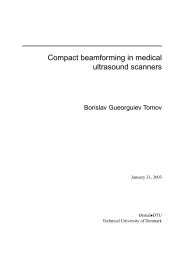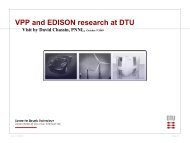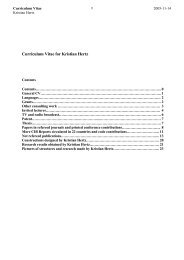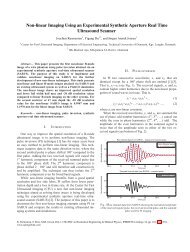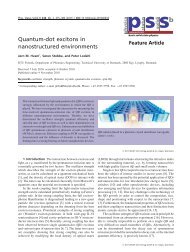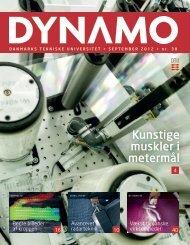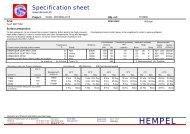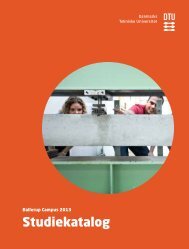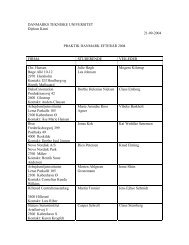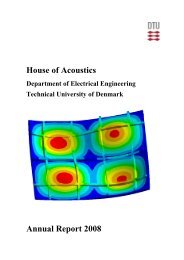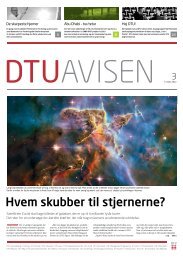Role of Intestinal Microbiota in Ulcerative Colitis
Role of Intestinal Microbiota in Ulcerative Colitis
Role of Intestinal Microbiota in Ulcerative Colitis
Create successful ePaper yourself
Turn your PDF publications into a flip-book with our unique Google optimized e-Paper software.
<strong>of</strong> the enterotypes was formed by three dist<strong>in</strong>ct clusters. Two <strong>of</strong> these clusters are rich <strong>in</strong><br />
Bacteroides and Prevotella (enterotype 1 and enterotype 2, respectively), whereas the third<br />
cluster is richer than enterotype 1 and enterotype 2 <strong>in</strong> Rum<strong>in</strong>ococcus (Clostridiales order), Alistipes<br />
and Akk. muc<strong>in</strong>iphila (enterotype 3) [3]. The present study demonstrated a predom<strong>in</strong>ance <strong>of</strong><br />
Bacteroides spp. and Prevotella spp. <strong>in</strong> UC patients <strong>in</strong> relapse and a predom<strong>in</strong>ance <strong>of</strong> the C. leptum<br />
subgroup, Akk. muc<strong>in</strong>iphila and Lactobacillus spp. <strong>in</strong> the healthy controls (Figure 1 and Table 2).<br />
This suggests that the enterotypes could be correlated with UC risk <strong>of</strong> <strong>in</strong>dividuals.<br />
Bifidobacterium spp. are believed to play an important role <strong>in</strong> ma<strong>in</strong>ta<strong>in</strong><strong>in</strong>g <strong>in</strong>test<strong>in</strong>al health<br />
[24,31,34]. In our study, B. bifidum was completely absent <strong>in</strong> the UC patients <strong>in</strong> relapse, while<br />
frequently occurr<strong>in</strong>g <strong>in</strong> the other groups. Previous <strong>in</strong> vitro studies have shown that several stra<strong>in</strong>s<br />
<strong>of</strong> bifidobacteria, with B. bifidum be<strong>in</strong>g most effective, have an antagonistic potential on LPS‐<br />
<strong>in</strong>duced <strong>in</strong>flammatory responses by block<strong>in</strong>g NF‐κB activation <strong>in</strong> <strong>in</strong>test<strong>in</strong>al epithelial cells<br />
[16,42,49]. Hence, a reduced level <strong>of</strong> B. bifidum and an altered composition <strong>of</strong> the Gram‐negative<br />
bacteria <strong>in</strong> UC patients <strong>in</strong> relapse compared to healthy controls, as observed <strong>in</strong> this study, may<br />
favor <strong>in</strong>test<strong>in</strong>al <strong>in</strong>flammation.<br />
Conclusions<br />
Based on the results presented with<strong>in</strong> this study, we conclude that UC patients <strong>in</strong> relapse appear<br />
to have a different fecal microbiota than healthy controls and this difference could be ascribed to<br />
the Gram‐negative bacteria, especially members <strong>of</strong> the Bacteroidetes phylum and Akk.<br />
muc<strong>in</strong>iphila. Some samples from patients <strong>in</strong> remission resemble those <strong>of</strong> patients <strong>in</strong> relapse, while<br />
others resemble those <strong>of</strong> the healthy controls, <strong>in</strong>dicat<strong>in</strong>g that the microbiota is unstable and<br />
perhaps changes dur<strong>in</strong>g the remission period, which, <strong>in</strong> theory, may contribute to provoke a new<br />
flare‐up. Our f<strong>in</strong>d<strong>in</strong>gs <strong>in</strong>dicate that an alteration <strong>in</strong> the composition <strong>of</strong> the Gram‐negative bacteria<br />
and a reduction <strong>of</strong> the beneficial Gram‐positive bacteria lactobacilli and B. bifidum plays a role <strong>in</strong><br />
provok<strong>in</strong>g flare‐ups <strong>in</strong> UC, but do not prove whether the observed changes are causal to or rather<br />
results from the relapse condition. Further longitud<strong>in</strong>al studies are warranted to extend the<br />
present f<strong>in</strong>d<strong>in</strong>gs and address this issue.<br />
13



